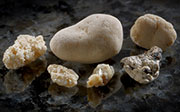
WEDNESDAY, July 29, 2015 (HealthDay News) — Kidney stones can quickly cause extreme pain, and passing the stones is the immediate goal for patients.
Now, a new study finds that the drug tamsulosin (Flomax) can boost the passage of large kidney stones, but not small ones.
“Small stones usually pass on their own, so it’s not too surprising that drug therapy did not help in this study,” said Dr. Warren Bromberg, chief of urology at Northern Westchester Hospital in Mt. Kisco, N.Y.
On the other hand, “anything that assists in passing a large stone, which otherwise would lead to prolonged pain and surgical intervention, is well worth it,” said Bromberg, who was not involved in the new research.
The study was led by Jeremy Furyk of Townsville Hospital in Queensland, Australia. His team found that 28 days after visiting an emergency department for any size of kidney stone, 87 percent of patients treated with tamsulosin and nearly 82 percent of those treated with a placebo passed their kidney stones.
That difference was not considered significant, the researchers noted.
However, among patients with large stones — between 5 and 10 millimeters long — about 83 percent of patients who took tamsulosin passed stones, compared with 61 percent of those who received a dummy medication.
The study was published online July 17 in the Annals of Emergency Medicine.
“Kidney stones bring more than a million Americans a year to emergency departments because they are excruciatingly painful,” Furyk said in a journal news release.
“The news on small kidney stones isn’t positive, but tamsulosin appears to offer benefit to those unlucky people whose kidney stones are really big,” he said.
And, “for patients with small kidney stones, time seems to be the one sure cure,” Furyk said. “However, when treating patients with large kidney stones, emergency physicians should definitely consider tamsulosin,” he concluded.
Bromberg said the introduction of medicines into kidney stone care has upped passage rates while reducing pain. Other drugs in the same class as tamsulosin, such as terazosin and doxazosin, appear to be equally effective, Bromberg noted.
Dr. David Hoenig is a specialist in kidney stone treatment and chief of urology at North Shore-LIJ’s Arthur Smith Institute for Urology, in New Hyde Park, N.Y. He said that when stones become lodged in the ureter — the channel between the bladder and the kidney — “extreme pain” often brings patients to the ER.
“Many stones do pass on their own — as long as pain is controlled and there is no fever, a period of observation for spontaneous passage is reasonable,” Hoenig said. “Follow-up is critical, however: long term blockage of the kidney, untreated, can lead to kidney damage.”
More information
The U.S. National Institute of Diabetes and Digestive and Kidney Diseases has more about kidney stones.
Copyright © 2026 HealthDay. All rights reserved.

